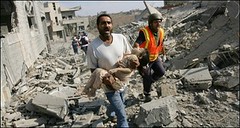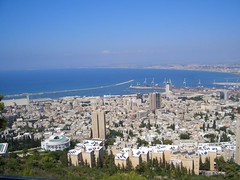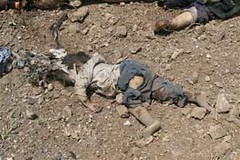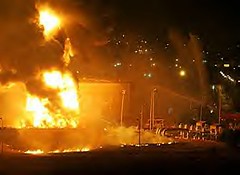Qana was hit at least 80 times. Eventually, inevitably a shelter full of civilians was hit.
You would think that the Israelis (the Israelis!) would understand the moral danger of assigning collective guilt and issuing collective punishment.
Listen to a wise man, Juan Cole, on the difference between Hezbollah and al-Qaeda:
Western and Israeli pundits keep comparing Hizbullah to al-Qaeda. It is a huge conceptual error. There is a crucial difference between an international terrorist network like al-Qaeda, which can be disrupted by good old policing techniques (such as inserting an agent in the Western Union office in Karachi), and a sub-nationalist movement.Remember, Hezbollah has the support of about 40% of the Lebanese population, like our allies in Iraq, they are a political party with seats iparliamentnt as well as a military wing. Again, Dr. Cole:
Al-Qaeda is some 5,000 multinational volunteers organized in tiny cells.
Hizbullah is a mass expression of subnationalism that has the loyalty of some 1.3 million highly connected and politically mobilized peasants and slum dwellers. Over a relatively compact area.
The main factor in causing these peasant sharecroppers to become politically aware and mobilized was the Arab Israeli conflict. The Israelis stole some of their land in 1948 and expelled 100,000 Palestinians north into south Lebanon, where they competed for resources with local Lebanese Shiites. In the late 1960s and early 1970s the Palestinians became politically and militarily organized by the PLO. The Shiites' conflict with the PLO in the southern camps in the 1970s was probably a key beginning, but from 1982 it was primarily their conflict with the Israeli Occupation army that spurred them on.
He is speaking here of Shia Lebanese peasants. Rural folk who practice a different form of Islam from the orthodox Sunni variety (I'm not going to define it further here, some 60% of Iraqi are Shia; if the general readership after three+ years of war doesn't grasp the difference, God help us.) He continues,
Where subnationalisms are organized by party-militias willing to use carbombings and other asymmetrical forms of warfare, they are extremely difficult, if not impossible to defeat militarily. It would take a World War II style crushing military defeat of these populations, with the willingness of the conqueror to suffer tens of thousands dead in troop casualties. Israel is not even in a position to risk such a thing, given its small population.
Hizbullah is not like al-Qaeda in any way, sociologically speaking, and making such an analogy is a sure way for a general or politician to trick himself into entering the fires of hell.
What the Israelis set out to do, if they intended to "destroy" or even substantially attrite Hizbullah, was completely impractical. What they have done is to convince even Lebanese formerly on the fence about the issue that Hizbullah's leaders were correct in predicting that Lebanon would again be attacked in the most brutal and horrible way by the Israelis and that an even more powerful deterrent is needed. I.e more silkworms, not fewer. . The days when the Israelis could lord it over disconnected unmobilized Arab peasant villagers with their high tech army are coming to a close. The Arabs are still very weak, but are throwing up powerful asymmetrical challenges (e.g. party-militias with silkworm missiles!). Israeli alarm about the new connectedness of their foe explains the orgy of destruction aimed at bridges, roads, television and radio facilities and internet servers. But it is too late to disconnect the south Lebanese, who can easily and quickly rebuild all those connectors.
One hope the Israeli hawks appear to entertain is that they can permanently depopulate strips Lebanon south of the Litani river. Since most Shiites vote Hizbullah and offer political support and cover to it, fewer people means fewer assets for the party-militia. This project would require the total destruction of large numbers of villages and the permanent displacement of their inhabitants north to Beirut.
That is why the massacre at Qana occurred.





